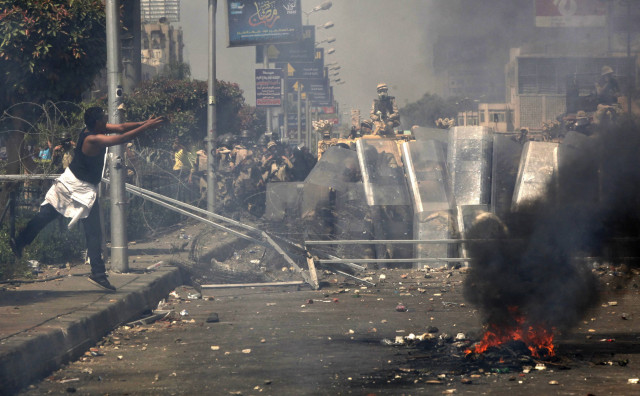Pandemonium in Cairo: ElBaradei resigns as emergency imposed in Egypt, again
278 people dead and 1403 injured in violence condemned by countries across the world.

Members of the Muslim Brotherhood and supporters of ousted Egyptian President Mohamed Mursi throw stones at riot police and the army during clashes. PHOTO: REUTERS.
The violence in Cairo, that drew international condemnation, sparked deadly clashes across the country.
Egypt's army-installed authorities declared a month-long state of emergency effective from 4:00 pm (1400 GMT) Wednesday, and slapped Cairo and other provinces with 7:00 pm to 6:00 am curfews.
Three churches were attacked in central Egypt, with Christian activists accusing Morsi loyalists of waging "a war of retaliation against Copts (native Christians) in Egypt".
Hours after the first tear gas canisters rained down on protest camps set up by Morsi's supporters in Rabaa al-Adawiya, the Egyptian health ministry confirmed 278 people as dead and 1403 people as injured from clashes across the country.
The largest toll was at the Rabaa al-Adawiya protest camp in Cairo, where an AFP correspondent counted 124 bodies. In contrast, health ministry spokesman Mohammed Fathallah said 61 people had died there.
Among those who died in the clashes was 17-year-old Asmaa al-Beltagui, daughter of wanted Muslim Brotherhood leader Mohammed al-Beltagui, a spokesperson for the movement said.
Britain's Sky News said its veteran cameraman Mick Deane was shot and killed while covering the deadly violence.
Security officials had spoken of a gradual dispersal of the sit-ins over several days but the dramatic descent on the squares shortly after dawn came as a surprise to many.
Al-Azhar, Sunni Islam's main seat of learning, which sided with the military in its overthrow of Morsi on July 3, distanced itself from the crackdown.
"Al-Azhar stresses to all Egyptians that it did not know about the methods used for the dispersal of the protests except through media channels," Grand Imam Ahmed al-Tayyeb said in a televised statement.
Witnesses said that after firing tear gas, security forces surged into Rabaa al-Adawiya, sparking pandemonium among the thousands of protesters who had set up the camp soon after Morsi was ousted.
Men in gas masks rushed to grab each canister and dunk them in containers of water, as the main stage near the mosque of the camp blared Islamic anthems and protesters chanted "Allahu Akbar" (God is greatest.)
Clashes quickly erupted between protesters and security forces on the outskirts of the camp, with automatic fire reverberating across the square.
Protest leaders wearing gas masks stood defiantly on a stage while crowds of people wearing face masks stood amid the swirling tear gas as bulldozers began dismantling the camp.
In the smaller of the protest camps at Al-Nahda square in central Cairo, police said they took control of the square after two hours.
Television footage showed flattened tents, as women and children flanked by police and army troops were led out of the square.
Dozens rounded up in the dispersal were shown sitting on the ground, handcuffed and surrounded by security forces.
The violence came amid international appeals for calm.
Fathallah said 21 died at the Nahda Square camp in Cairo, 18 in Helwan south of the capital and the rest in several provinces.
Europe's leading powers along with Iran, Qatar and Turkey strongly denounced the use of force by the military-backed interim government.
It was a dramatic turn of events for the Muslim Brotherhood, who just over a year ago celebrated Morsi's victory as Egypt's first elected president.
But his turbulent year in power, marred by political turmoil, deadly clashes and a crippling economic crisis, turned many against the Brotherhood's movement.
On June 30, millions took to the streets to call on the army to remove Morsi.
Morsi's Muslim Brotherhood urged Egyptians to take to the streets in their thousands to denounce the "massacre".
"This is not an attempt to disperse, but a bloody attempt to crush all voices of opposition to the military coup," Brotherhood spokesperson Gehad al-Haddad said on Twitter.
But the anger against the movement was evident Wednesday as residents of several neighbourhoods clashed with Morsi loyalists.
Clashes also erupted between security forces and Morsi loyalists in the northern provinces of Alexandria and Beheira, the canal provinces of Suez and Ismailiya and the central provinces of Assiut and Menya.
In Menya, witnesses said the Saint Ibram and Virgin Mary church and the Saint Mina church were torched.
Assailants also threw firebombs at Mar Gergiss church in Sohag, a city with a large community of Coptic Christians who comprise up to 10 percent of Egypt's 84 million people, causing it to burn down, the agency said.
Coptic Pope Tawadros II, together with Al-Azhar's Tayyeb, had supported the military and sat by army chief Abdel Fattah al-Sisi when he announced that Morsi had been deposed and laid out a new political roadmap for the country.
Vice President ElBaradei resigns
Egypt's interim vice president, Nobel Laureate Mohamed ElBaradei, resigned on Wednesday after the security forces violently broke up protest camps set up by supporters of the deposed president, Mohamed Mursi.
In a resignation letter to Interim President Adly Mansour, ElBaradei said that "the beneficiaries of what happened today are those who call for violence, terrorism and the most extreme groups".
"It has become difficult for me to continue bearing responsibility for decisions that I do not agree with and whose consequences I fear. I cannot bear the responsibility for one drop of blood."
Wednesday's crackdown came just hours after the United States, which provides $1.5 billion in mostly military aid to Egypt every year, urged the military-backed interim government to allow Morsi supporters to protest freely.



















COMMENTS
Comments are moderated and generally will be posted if they are on-topic and not abusive.
For more information, please see our Comments FAQ